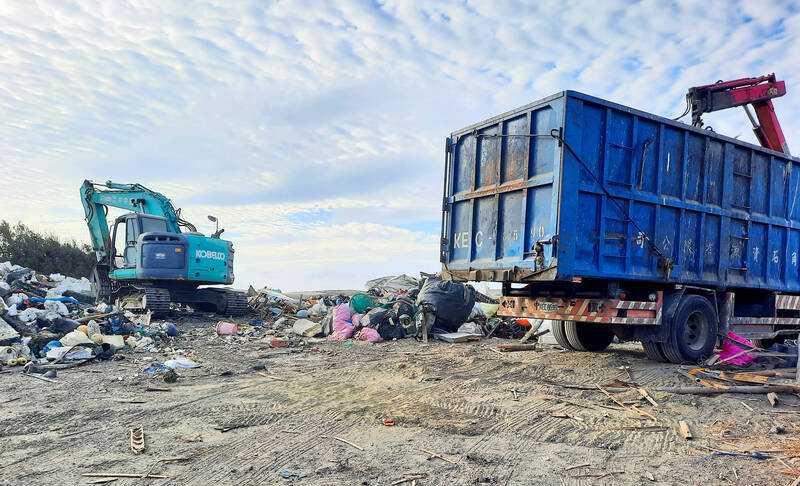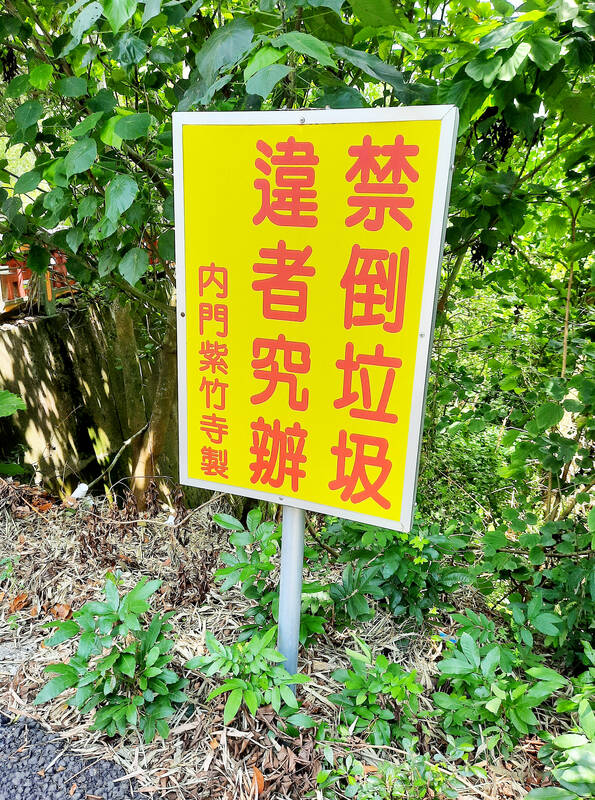It’s an experience many lovers of the outdoors have reported. Driving or riding through Taiwan’s mountainous interior, pausing to admire and photograph the scenery, they turn their gaze from distant peaks to the slope just below the road — and are appalled to see what locals call a “trash waterfall” (垃圾瀑布).
Garbage trucks serve every community in the country, yet sickening quantities of rubbish get heaved into creeks or discarded in woodlands. Sometimes it’s industrial or commercial waste, dumped by business people who don’t want to pay to have it disposed of properly. But much of it is household trash or picnic leftovers thrown away by individuals who, it seems, simply can’t be bothered to deal with their litter in the right way.
Just last week, the Liberty Times (the Chinese-language sister newspaper of the Taipei Times) reported an uptick in garbage dumping in the mountainous parts of Keelung City.

Photo : Steven Crook
Such behavior is illegal, of course. In Taipei, dropping a cigarette butt on the sidewalk could cost you NT$3,600. The minimum penalty for those who breach Miaoli County’s littering law is a fine of NT$1,200.
Article 46 of the Waste Disposal Act (廢棄物清理法) — which applies countrywide — stipulates that those who arbitrarily dispose of hazardous waste can be fined up to NT$15 million and/or jailed for a maximum of five years. The same article outlaws “land refilling or waste piling without permission from the competent authority,” as well as waste storage or disposal without first obtaining proper permission.
The Waste Disposal Act explicitly covers enforcement personnel who authorize disposal without the proper documentation, or which they know to be illegal. Yet collusion between local officials and those trying to get rid of their waste doesn’t always take the form of cutting corners to save money.

Photo : Steven Crook
THE INCINERATION BOTTLENECK
As Chinese-language online media The Reporter explained on Aug. 24, 2022, garbage incinerators controlled by local governments prioritize household waste. In recent years, these facilities have lacked spare capacity, so licensed waste carriers often have to call in favors if they want the refuse they’ve collected from businesses or factories to be properly incinerated.
The consequences of this are predictable. Some unscrupulous entrepreneurs save themselves the considerable expense of incineration by dumping waste on unused farmland. Given that making decent money from agriculture is so difficult, it’s no wonder some landowners consent to having their land used in this way.

Photo courtesy of the Tainan Environmental Protection Bureau
Some fly-tippers get caught. On Jan. 20, 2022, Taiwan Times (a Chinese-language newspaper not to be confused with Taipei Times) reported that police staked out a hillside in Tainan’s Zuojhen District (左鎮) for several nights, eventually arresting a man surnamed Lee (李). He later confessed to having left several truckloads of rubble and other demolition waste on the land, which is managed by the Forestry and Nature Conservation Agency.
Li faced a fine of up to NT$300,000. The report didn’t say if he’d also have to foot the bill for removing the 50 metric tons of foreign matter the authorities estimated he’d brought to the site. The amount of casually discarded waste in Taiwan’s countryside suggests that neither the current penalties nor the risk of detection seriously deter this kind of behavior.
Property owners who allow improper dumping on their land may have to pay for environmental remediation. A Feb. 12, 2019 post on the Web site of Tainan City Government’s Environmental Protection Bureau — presumably intended as a warning to landowners — states that a man surnamed Huang (黃) was being held liable for what had happened on a piece of land in Annan District (安南), even though he’d sold it in 2014. Concluding from aerial photos that the waste plastic and other trash found at the site had been buried there during Huang’s ownership, “due to his neglect,” the bureau said he was liable to pay for the cleanup, which was expected to cost an eye-watering NT$40 million.
The post went on to advise landowners to fence off their properties and conduct routine inspections. They should also notify the bureau as soon as they notice any illegal dumping; failure to do so is likely to leave them financially responsible for garbage removal and site decontamination.
Asked why this kind of dumping appears to be such a serious problem in Taiwan, Lin Cheng-han (林政翰) says the key reason is that the central government’s waste management policies have led to an imbalance between production and disposal.
“When promoting industrial development, the government should consider if our waste treatment capacity is sufficient, just as every house should have enough toilets for its inhabitants,” says Lin, an associate researcher at Tainan Community University’s Environmental Action Group.
HAZARDOUS INDUSTRIAL WASTE
Lin has highlighted a number of cases of contamination and illegal dumping in the Tainan area. Last year, he spoke to the media about dangerously high copper levels along one stretch of the Erren River (二仁溪), a waterway which has long been heavily polluted (see “A river in recovery” in the July 24, 2020 Taipei Times).
Earlier this year, he said that among the 1,300 metric tons of waste found on state-owned land next to Freeway 3’s Dongshan Service Area (東山服務區) was a significant quantity of hazardous material. However, because the authorities had previously concluded that it was all general industrial waste, the three perpetrators who were successfully prosecuted received light sentences.
The laws and regulations which stipulate that industrial zones should have appropriate waste treatment facilities “aren’t strictly enforced, resulting in a lack of capacity for treating industrial waste,” Lin says.
Surging industrial output combined with the incinerator bottleneck has driven up the cost of properly disposing of waste, making dishonest waste-handling a profitable business. Lin says that collecting evidence of environmental crimes is difficult. What’s more, he complains that the penalties for illegal dumping are so light they’re “a disguised form of encouragement for this crime.”
To ameliorate this problem, Lin says, Taiwanese should pressure the government to take action to reduce the amount of waste the country generates. The current push to establish a global treaty to end plastic pollution is evidence that this is a global trend, he adds.
“The government should set a ceiling for the total amount of waste and then set year-by-year reduction targets,” Lin says.
To encourage people to separate recyclables and to compost as much organic waste as they can, he hopes that every city and county can follow the lead of Taipei and New Taipei City, and require all householders to purchase special trash bags. Consumer products should be redesigned so every bit of packaging can be reused or at least recycled; an additional tax should be applied to items that have to be disposed of after a single use.
Implementing these policies would free up incinerator capacity, Lin says, who also criticizes the government’s current promotion of solid recovered fuel (SRF).
SRF is waste that’s been shredded, dehydrated and compressed so it can be burned in boilers as a replacement for fossil fuel. Its supporters claim that burning the fuel is more efficient than generating electricity by incinerating untreated garbage, and that it can reduce Taiwan’s dependence on energy imports.
Lin counters that SRF fired-boilers pollute the air and are inefficient compared to conventional power plants.
“To put it bluntly, SRF is still burning resources. It’s an economic model in which, the greater the amount of waste, the greater the profit. This runs counter to the idea of waste reduction and it shouldn’t be the direction of government policy,” he says.
The Oct. 9 edition of this column will look at how ordinary residents can make a difference in the war against illegal dumping.
Steven Crook, the author or co-author of four books about Taiwan, has been following environmental issues since he arrived in the country in 1991. He drives a hybrid and carries his own chopsticks. The views expressed here are his own.

In the March 9 edition of the Taipei Times a piece by Ninon Godefroy ran with the headine “The quiet, gentle rhythm of Taiwan.” It started with the line “Taiwan is a small, humble place. There is no Eiffel Tower, no pyramids — no singular attraction that draws the world’s attention.” I laughed out loud at that. This was out of no disrespect for the author or the piece, which made some interesting analogies and good points about how both Din Tai Fung’s and Taiwan Semiconductor Manufacturing Co’s (TSMC, 台積電) meticulous attention to detail and quality are not quite up to

April 21 to April 27 Hsieh Er’s (謝娥) political fortunes were rising fast after she got out of jail and joined the Chinese Nationalist Party (KMT) in December 1945. Not only did she hold key positions in various committees, she was elected the only woman on the Taipei City Council and headed to Nanjing in 1946 as the sole Taiwanese female representative to the National Constituent Assembly. With the support of first lady Soong May-ling (宋美齡), she started the Taipei Women’s Association and Taiwan Provincial Women’s Association, where she

Chinese Nationalist Party (KMT) Chairman Eric Chu (朱立倫) hatched a bold plan to charge forward and seize the initiative when he held a protest in front of the Taipei City Prosecutors’ Office. Though risky, because illegal, its success would help tackle at least six problems facing both himself and the KMT. What he did not see coming was Taipei Mayor Chiang Wan-an (將萬安) tripping him up out of the gate. In spite of Chu being the most consequential and successful KMT chairman since the early 2010s — arguably saving the party from financial ruin and restoring its electoral viability —

It is one of the more remarkable facts of Taiwan history that it was never occupied or claimed by any of the numerous kingdoms of southern China — Han or otherwise — that lay just across the water from it. None of their brilliant ministers ever discovered that Taiwan was a “core interest” of the state whose annexation was “inevitable.” As Paul Kua notes in an excellent monograph laying out how the Portuguese gave Taiwan the name “Formosa,” the first Europeans to express an interest in occupying Taiwan were the Spanish. Tonio Andrade in his seminal work, How Taiwan Became Chinese,